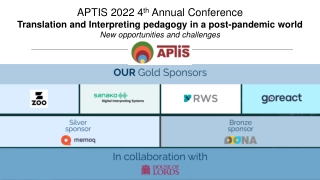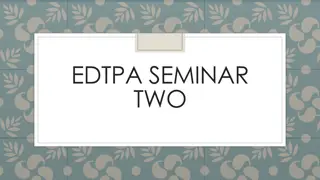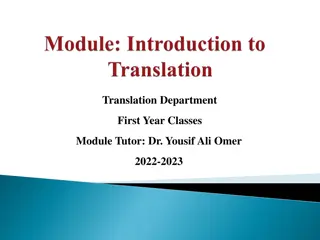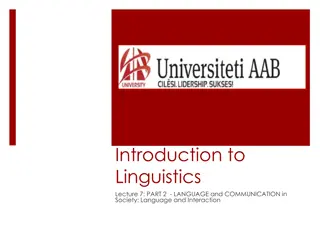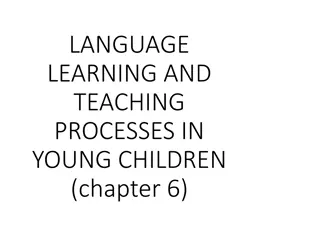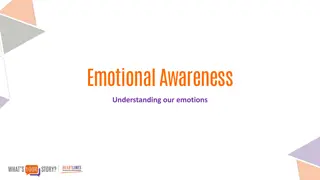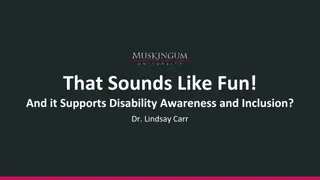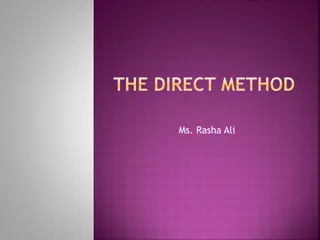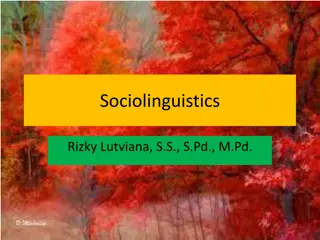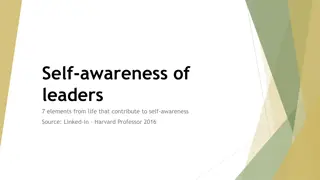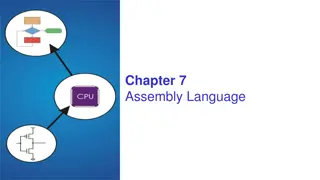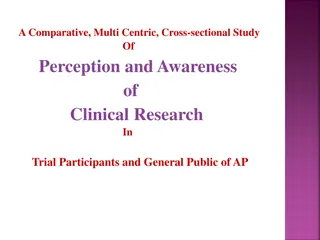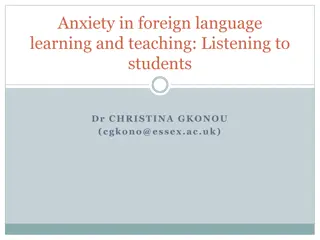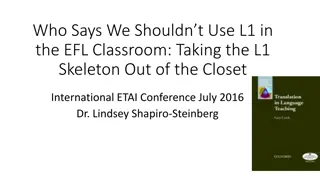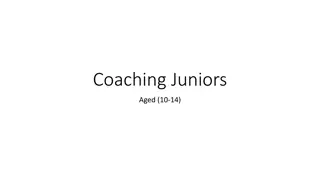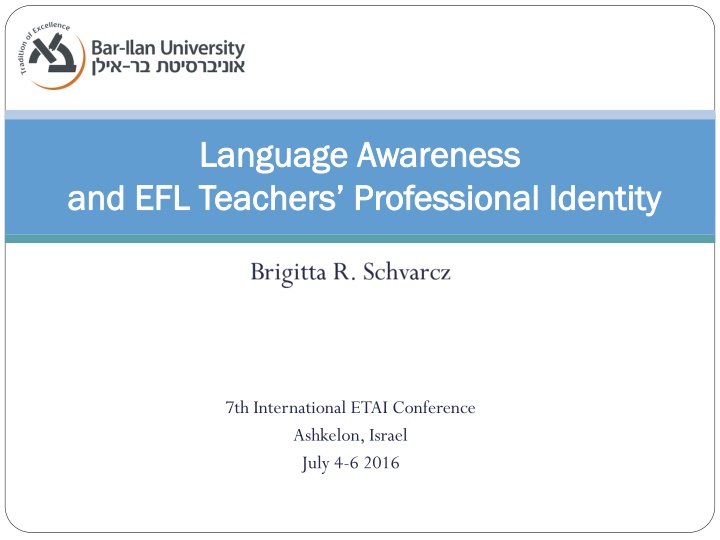
Insights into Language Awareness and EFL Teacher Professional Identity
Explore the significance of language awareness (LA) for EFL teachers' professional development and identity through a research study at the 7th International ETAI Conference. Discover how LA influences effective language teaching practices, teacher education programs, and linguistic knowledge integration into classroom instruction.
Download Presentation

Please find below an Image/Link to download the presentation.
The content on the website is provided AS IS for your information and personal use only. It may not be sold, licensed, or shared on other websites without obtaining consent from the author. If you encounter any issues during the download, it is possible that the publisher has removed the file from their server.
You are allowed to download the files provided on this website for personal or commercial use, subject to the condition that they are used lawfully. All files are the property of their respective owners.
The content on the website is provided AS IS for your information and personal use only. It may not be sold, licensed, or shared on other websites without obtaining consent from the author.
E N D
Presentation Transcript
Language Language Awareness Awareness and EFL Teachers Professional and EFL Teachers Professional Identity Identity 7th International ETAI Conference Ashkelon, Israel July 4-6 2016
Rationale of this study Rationale of this study Linguistics ~ language teaching (Cotts 2008, Andrews 2008, Giusti 2009, Bartels 2005) Linguistics Subject-Matter Knowledge Pedagogical Knowledge Knowledge of student learning (Shulman 1987) My approach: sounding out voices from the field
What is LA What is LA? ? explicit knowledge about language, and conscious perception and sensitivity in language learning, language teaching and language use (The Association for Language Awareness) professionally known as the notion of language awareness (LA) or knowledge about language (KAL). (Borg 2005, Bartels 2005, Cenoz & Hornberger 2010)
LA LA and Linguistics and Linguistics Fundamental areas of linguistics to be encompassed by teachers: i. Core building blocks of language (phonology, morphology, syntax, semantics, pragmatics) ii. Language acquisition theories iii. Socio-linguistic and cultural aspects of language (Denham and Lobeck 2010)
LA and Teaching Practice LA and Teaching Practice Teachers with a high level of LA effective language work in the classroom Borg (2005) and Bartels (2005) More accurate picture of the target language Provide clearer explanations and representations of grammar Better understand learner s conceptual difficulties Refined error-analysis
How is LA developed? How is LA developed? Teacher education programs have a significant impact on the acquisition of LA (Borg 2005)
Research Questions Research Questions How do teacher education programs affect LA? Are linguistic courses relevant to actual classroom practice? Is LA necessary to being effective practitioners? 1. 2. 3.
Methodology Methodology 22 participants (with wide spectrum of teaching experience) Digital Questionnaire 11 questions (Likert scale (1-5) multiple choice & open ended) 4 categories: General attitude towards linguistic courses 1. Suggest a metaphor for the linguistic training you received during your teacher education program and explain your choice. OPEN-ENDED QUESTION
Methodology Methodology 22 participants (with wide spectrum of teaching experience) Digital Questionnaire 11 questions (Likert scale (1-5) multiple choice & open ended) 4 categories: General attitude towards linguistic courses LA relevance, knowledge transfer & application in classroom practice 1. 2. To what extent are you able to transfer this knowledge to the context of your own teaching? 1 2 3 4 5 not at all to a great extent
Methodology Methodology 22 participants (with wide spectrum of teaching experience) Digital Questionnaire 11 questions (Likert scale (1-5) multiple choice & open ended) 4 categories: General attitude towards linguistic courses LA relevance, knowledge transfer & application in classroom practice Linguistics and methodology division and fusion Do the two fields - teaching pedagogy and linguistics - merge for you? If you found some correlation between knowledge of language structures and your pedagogical practice, please indicate when, how or why this occurred. If you see no correlation between linguistics and pedagogy please tell us why you think it is so. OPEN-ENDED QUESTION 1. 2. 3.
Methodology Methodology 22 participants (with wide spectrum of teaching experience) Digital Questionnaire 11 questions (Likert scale (1-5) multiple choice & open ended) 4 categories: 1. General attitude towards linguistic courses 2. LA relevance, knowledge transfer & application in classroom practice 3. Linguistics and methodology division and fusion 4. The essentiality of LA to being good teachers In your opinion, is necessary in order to be a good teacher? Yes No I don't know
Highlighted Findings Highlighted Findings 77% positive opinions 10% negative opinions 11% blank 2 % other knowledge transfer: 3.2 score (on a scale 1-5) (lowest value 1 2 participants; highest value 5 no participant) The merger of Linguistics and Pedagogical Practice 50% no, very little correlation 50% direct influence 19/22 LA is essential to their professional identity
Echoes from the field Echoes from the field Linguistic training as the foundation to language teaching I cannot build any lesson plan without having the foundation of the language I teach. Linguistics ~ teaching of grammar : these courses enhanced the importance of teaching grammar influenced my understanding of different rules and structures existing in the English language.
Linguistics in practice Linguistics in practice Morphology I use the word formation information when teaching new vocabulary in class Phonetics the ability to explain phonological changes that come from different linguistic origins helps in class Pedagogical grammar from the grammar point of view- I think that I use much of the understanding regarding verbs (as BE and its complications) different tenses and how to compare them
I am a better teacher I am a better teacher It deeply correlates I identify very much with my students' confusion about [the language], with their questions about orthography, and I like to answer correctly every question they ask about the topic. I was so glad to be able to explain and to demonstrate why and how we remember to put the "g " in the word "sign ", it comes from signature . Moreover, to teach my students how to play with prefixes and suffixes was great fun and very encouraging to them to read new " intimidating" words. I am sure that I'm a better teacher because of having awareness and metacognitive knowledge about the language and how we learn it and deal with it.
Discussion EFL teachers in the Israeli education system greatly value their linguistic training and report a high level of applicability thereof torture? (Borg 2005) Teachers in our sample found linguistic courses to be the basic building blocks of their professional identity and to be relevant to the presentation of grammatical topics. Recommendation: Raise greater awareness to linguistic theory in teacher training & provide explicit instruction on its application in classroom practice
Future Directions Future Directions Larger sample Correlation between pupil s age group (elementary, junior high, high school) and type of linguistic knowledge applied the impact of years of teaching experience on the integration of the two fields Check students - prospective teachers , perceptions of LA Development of linguistically-based methods
References References Andrews, S.J. (2010). Teacher Language Awareness. In J. Cenoz and N. Hornberger (eds.) Knowledge About Language, 287-298. Springer. Bartels, N. (2005). Applied linguistics and language teacher education: What we know. In Applied linguistics and language teacher education (pp. 405-424). Springer US. Borg, S. (2005). Experience, knowledge about language and classroom practice in teaching grammar. In Applied linguistics and language teacher education (pp. 325-340). Springer US. Cenoz, J., & Hornberger N.H. 2008. Knowledge About Language, 15-30. Springer US. Cotts J.M. (2008). Knowledge about Language in the Mother Tongue and Foreign Language Curricula. In J. Cenoz and N.H. Hornberger (eds.) Knowledge About Language, 15-30. Springer US. Denham, K., & Lobeck, A. (2010). Linguistics at school: Language awareness in primary and secondary education. Cambridge University Press. Giusti, G. (2009). Strumenti di analisi per la lingua inglese. Torino, Utet Libreria. Shulman, L. S. (1987). Knowledge and teaching: Foundations of the new reform. Harvard Educational Review, 57.1, (pp.1-22). Rothstein, S. (2010). Counting, measuring and the mass count distinction. The Journal of Semantics 27, 3.343-397. Schvarcz, B,R (in review). Language Awareness and EFL teachers professional identity. To appear in Constructions of Identity VIII. Cluj Napoca: Babes-Bolyai University Press. The Association for Language Awareness. http://www.languageawareness.org/
I wish to thank the group of teachers who participated in this research, and who were active in discussions on the topic, especially those who took part in my in service- training courses at the Kiriyat Motzkin, Hadera and Baqa Pisga centers. Contact Bar-Ilan University bridget.schvarcz@gmail.com

